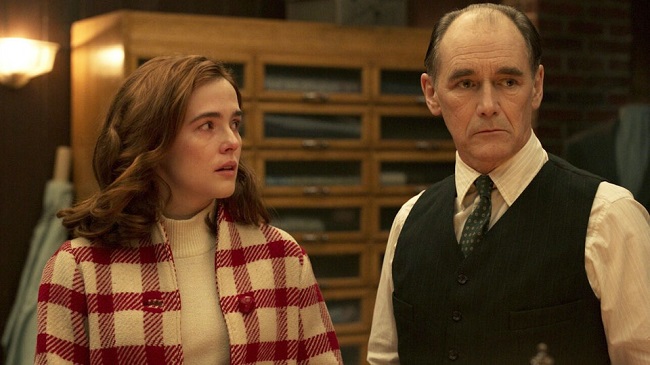Mark Rylance plays a tailor in this gangster exercise set in Chicago in 1956, and he’s got a lot of scissors.
The thugs in “The Outfit” have plenty of devastating blows at their disposal, but none of them can hold the screen like Mark Rylance does when he merely stands, stares, or sews. His main character, Leonard, is a custom tailor who used to work on Savile Row but now runs a modest shop in Chicago.

There, with his head bowed, he snips and stitches with the kind of delicate, precisely articulated gestures that epitomise the tenderness and beauty of Rylance’s work.
In Most Cases, a Great Actor is all you Need From a Film.
The inclusion of Mark Rylance elevates “The Outfit,” a mildly entertaining gangster film that fails to provide much in the way of explanation. It’s a throwback-y style train that takes place in 1956 and focuses on Leonard, a former tailor in London who now manufactures suits for an eclectic clientele that includes members of the criminal underground.
His store is dark and claustrophobic, and shady characters are constantly coming and going, leaving off envelopes in a secured box while he goes about his day. In the same way that the film uncovers the mystery of the field bit by little, Leonard is also revealed to be a suspenseful mystery.
Plot
Leonard is slower to unlock, but the field’s secrets are crucial to the plot, which also involves a hidden recording, an undisclosed romance, warring crews, and the larger mystery that gives the film its namesake. Mabel (Zoey Deutch), one of two women in the mix, is Leonard’s employee; Nikki Amuka-Chicken also makes an appearance as a gorgeous villain. Mabel is usually there to welcome customers and enliven the store’s otherwise drab interior; she smiles at one villain (Dylan O’Brien) and gives the cold shoulder to another (Johnny Flynn), amongst others.
Graham Moore and Johnathan McClain, who collaborated on the screenplay, switch around their limited things, shed the necessary blood, and moderately complicate the situation. The narrative is witty, thin, and self-aware; it plays out like a lengthy game of cat and mouse, yet the roles of the two characters in this explicit duet change with time.
To a large extent, the film seems to have been conceived by a few of film buffs who wanted to experiment with style for the sake of style. That’s understandable, after all. That’s as good of a reason as any to dust off some fedoras and hire a cast of assorted talents to play gangsters from the 1930s and ’40s in Britain.
Characters in “The Outfit” mostly move in and out of the shop’s two main rooms, which might feel confining and difficult to manage. Moore’s first foray into directing is a typical example of his work (he also penned “The Imitation Game”). Thoughtfully managing the home while working with film director Dick Pope.
Moore and Pope map the store’s (and the story’s) topography from various perspective factors with muted colours, alterations in depth of discipline, and complimentary staging and camera strikes. They make sure Leonard maintains his position at the centre of attention, in step with Rylance’s perfectly calibrated efficiency.
For his roles as William Kunstler in “The Trial of the Chicago 7” and the eccentric zillionaire in “Don’t Look Up,” Rylance donned wigs and false moustaches appropriate for their respective characters. As his captivating turn in Steven Spielberg’s Cold War movie “Bridge of Spies” shown, though, he is a master of restraint and he doesn’t need apparatus to carry you. Although his role here isn’t as lucrative, one of “The Outfitmany “‘s highlights is how it gives Rylance the opportunity to carve out his personality in quiet, intricately isolated passages.
Leonard’s focused but unobtrusive meticulousness in the workplace—how his hands glide over the material and control his enormous shears—better characterise him than any words could. In addition, you get to witness Rylance’s performance in tandem with a credible adversary.
This Is The Group That Always
Warning: this film contains graphic violence and strong language. The duration of one shift is 1 hr. 45 min. Presently playing in theatres.












